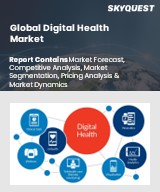
Report ID: SQSG35G2001

Report ID:
SQSG35G2001 |
Region:
Global |
Published Date: August, 2024
Pages:
165
|
Tables:
64 |
Figures:
75
Drivers
Integration of Big Data and Artificial Intelligence
Integration of modernized technologies is significantly impacting nearly every industry, and the healthcare industry is leading among others. The incorporation of big data and artificial intelligence in healthcare allows precise diagnosis, predictive analytics, and personalized treatments by healthcare experts for their patients. This encourages further innovations and improvements in digital health.
Growing Convenience Offered and Enhanced Internet Connectivity
Increasing shift for on-demand services and higher convenience offered by digital health is driving the use of digital health services. They offer enhanced access to healthcare data and services. Moreover, improved internet infrastructure is another key driver of the digital health market. Growing proliferation of smart devices and smartphones facilitates higher adoption of digital health apps and tools.
Restraints
Technology Integration Concerns and Restricted Interoperability
Integrating new digital health services with the current electronic health systems and healthcare systems could be resource intensive and challenging. Moreover, lack of interoperability and standardization among different digital health solutions might hamper smooth exchange of health information.
Legal & Ethical Issues and Concerns with Reliability & Data Accuracy
Potential legal implications and ethical considerations associated with digital health like liability and consent might create obstacles. Moreover, concerns regarding reliability and accuracy of information produced by digital health technologies could negatively impact adoption and trust.
Our industry expert will work with you to provide you with customized data in a short amount of time.
REQUEST FREE CUSTOMIZATIONDigital Health Market size was valued at USD 178 billion in 2022 and is poised to grow from USD 211 billion in 2023 to USD 881 billion by 2031, growing at a CAGR of 18.6% in the forecast period (2024-2031).
The digital health market players are using innovative strategies along with collaborations, mergers, and acquisitions deploying ways for enhancing the Healthcare Infrastructure and equipping it with future-ready digital advancements. Cloud computational technology and artificial intelligence (AI) are among the top used technologies among market players to generate high market share and have a competitive edge. 'Allscripts (US) ', 'McKesson Corporation (US) ', 'Apple Inc. (US) ', 'Alphabet Inc. (Google) (US) ', 'Microsoft Corporation (US) ', 'International Business Machines Corporation (IBM) (US) ', 'Athenahealth Inc. (US) ', 'Philips Healthcare (Netherlands) ', 'GE Healthcare (US) ', 'Siemens Healthcare (Germany) ', 'Qualcomm Life Inc. (US) ', 'Teladoc Health Inc. (US) ', 'Epic Systems Corporation (US) ', 'Johnson & Johnson (US) ', 'Agfa-Gevaert Group (Belgium) ', 'Infosys Limited (India) ', 'Wipro Limited (India) ', 'Tata Consultancy Services Limited (India) ', 'ECLINICALWORKS (US) ', 'MY MHEALTH LIMITED (UK)'
The adoption of smartphones, tablets, and PDAs has surged recently, becoming the primary source of internet connectivity in developed regions like North America and Europe. This trend is also rising in emerging areas due to affordable devices and expanding high-speed mobile networks. The widespread use of these mobile platforms significantly drives the digital health market, providing easy access to health apps, telemedicine, and wearable health tech. This technology enables proactive healthcare through remote consultations and real-time health monitoring.
Rising Demand Spurs Growth in mHealth Services: The surge in demand to enhance workflow efficiency across clinics, hospitals, and healthcare facilities propels the market for mHealth services. Additionally, continual technological advancements in developing advanced digital solutions, coupled with growing government and commercial initiatives, contribute to overall market expansion. For instance, scientists at the University of Illinois developed a camera to enhance smartphone diagnostic capabilities. In 2020, the mHealth technology sector dominated with the highest revenue share.
In 2023, North America led the market with a substantial revenue share of 38.2%, driven by technological advancements, increased healthcare IT spending to enhance infrastructure, favorable government initiatives, the rise of startups, and a readiness to embrace advanced technological solutions. Additional contributing factors include growing smartphone penetration, improved internet connectivity, and substantial funding opportunities. Furthermore, advancements in coverage networks, the rapid growth of smartphone adoption, an aging population, the prevalence of chronic diseases, and a shortage of primary caregivers also bolstered industry growth.
Want to customize this report? This report can be personalized according to your needs. Our analysts and industry experts will work directly with you to understand your requirements and provide you with customized data in a short amount of time. We offer $1000 worth of FREE customization at the time of purchase.

Report ID: SQSG35G2001